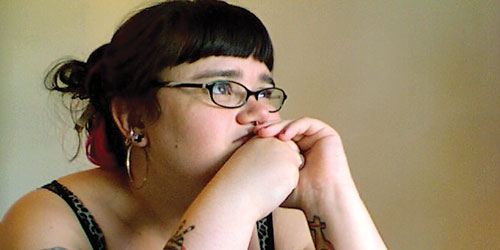
Sassafras Lowrey is an international author, educator and artist. She edited the Kicked Out anthology, which tells the stories of homeless LGBT youth. She spoke at the kickoff of the ACLU of Michigan and Ruth Ellis Center youth leadership initiative on Dec. 10.
What was the hardest part about telling your story?
I've been very open about my experience from the beginning, so that wasn't so much a struggle for me. But I think for many of the contributors to "Kicked Out" some of the difficulty came from being open about this part of their past that's still incredibly stigmatized – even within the LGBT community. They had concerns about the way that they would be seen by people in their community.
You've lived through your own horrors, but was there one story in Kicked Out that was difficult for even you to read or hear?
Everything that was shared by the contributors is, on some level, very difficult – very difficult for them and, thus, very difficult to read. But they're also, in this funny way, very empowering. A lot of people come up to me, having not read it, and say, 'This is going to be a very hard book to read. How depressing.' Then nine times out of 10 they come back to me and say, 'This was very inspiring.'"
What's the key to survival for LGBT youth who suddenly find themselves homeless?
There's not one answer because everyone's situation is different and the resources available to them are different. The big thing that I say, that was certainly key to my survival and is the best advice I can give, is to create family with other people who have similar experiences and other LGBT people in general.
What is it that these youth need from us as a community?
They really need support and that support can take a lot of different forms. On an institutional level they need our advocacy for securing funding for direct services that are working for homeless youth. We also as a community need to think about advocating our resources in terms of money that we donate, things that we donate as well as our time. Then, also, one of the really important things that people can do, regardless of how much money or time they have, is to start talking about these issues. We need to break down the stigma this carries and that means having conversations with your friends at the bar or wherever you may be about how these issues are impacting our community.
What's the answer to this epidemic?
I think that's the million dollar question and I don't think there is one thing that will end it. If we knew that, that would be incredible.











